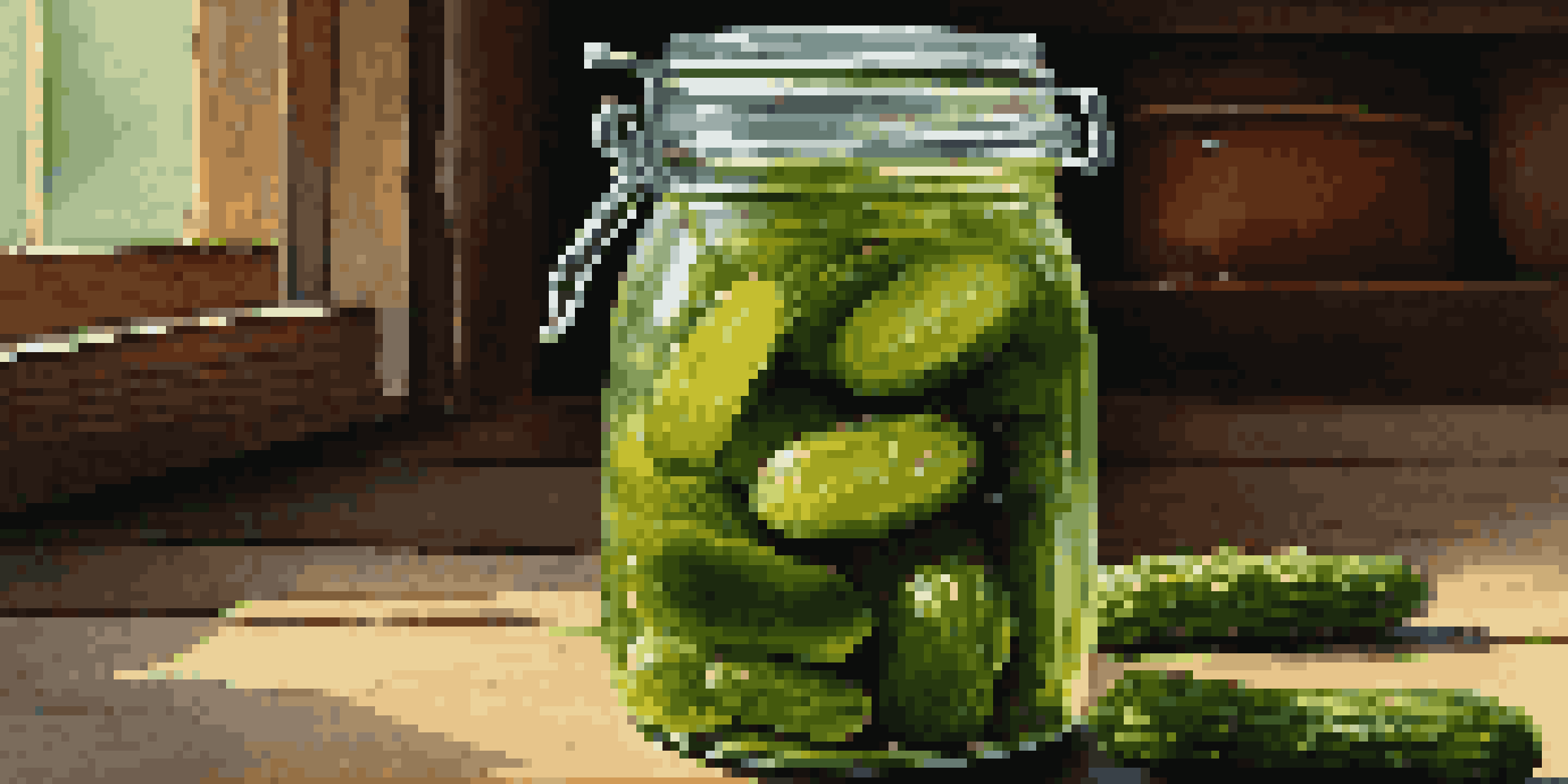The Benefits of Home Fermentation for Flavor Enhancement

What is Home Fermentation and Why It Matters
Home fermentation is the process of converting food into a flavorful, health-boosting delight through the power of microorganisms. This ancient technique, used for centuries, not only preserves food but also enhances its taste and nutritional value. Think of it as nature's way of intensifying flavors and adding complexity to your favorite dishes.
Fermentation is the age-old process of transforming food into something greater than the sum of its parts.
Fermented foods, like yogurt, kimchi, and sourdough bread, are packed with beneficial probiotics that support gut health. These live bacteria help balance your digestive system, leading to improved overall wellness. So, when you choose to ferment at home, you're not just adding flavor; you're also nurturing your body.
Moreover, engaging in home fermentation can be a fun and rewarding activity. It allows you to experiment with flavors and ingredients, making your culinary creations uniquely yours. Whether you're a seasoned chef or a kitchen novice, fermentation opens up a world of delicious possibilities.
Boosting Flavor Profiles with Fermentation
One of the most exciting aspects of fermentation is its ability to elevate the flavor of everyday ingredients. Through the fermentation process, simple vegetables can transform into tangy, robust condiments that add depth to any meal. Imagine turning a humble cucumber into zesty pickles or cabbage into crunchy sauerkraut—both bursting with flavor!

This transformation occurs due to the breakdown of sugars and starches by bacteria and yeasts, resulting in new flavor compounds. These compounds create complex tastes that are often described as savory, tangy, or umami-rich. Just a spoonful of fermented goodness can take your dish from bland to extraordinary.
Benefits of Home Fermentation
Home fermentation enhances flavor, boosts nutritional value, and offers numerous health benefits through the power of probiotics.
Additionally, fermentation can enhance the aroma of your food, making it even more appetizing. The scent of fermented products can evoke memories and emotions, connecting you to your culinary roots and traditions. So, if you're looking to impress at your next dinner party, a well-crafted fermented dish could be your secret weapon!
Health Benefits of Fermented Foods
Aside from flavor enhancement, fermented foods offer numerous health benefits that make them a worthwhile addition to your diet. They are rich in probiotics, which are live bacteria that promote a healthy gut microbiome. A balanced gut can lead to improved digestion, enhanced immunity, and even better mood regulation.
The act of fermentation is a way to preserve food, but it is also a way to enhance flavor and nutrition.
Moreover, fermentation can increase the bioavailability of nutrients in food, meaning your body can absorb vitamins and minerals more effectively. For instance, fermenting grains can break down phytic acid, allowing you to access more iron and zinc. This process not only boosts your nutritional intake but also makes meals more satisfying.
Incorporating fermented foods into your daily routine can also help reduce inflammation and support heart health. By creating a diverse diet filled with these tasty options, you're setting yourself up for a healthier lifestyle. So, whether it's adding a dollop of yogurt to your breakfast or enjoying a side of kimchi, you're doing your body a favor!
Easy Fermentation Projects to Get Started
If you're new to fermentation, don't worry! There are plenty of simple projects you can start with at home. One of the easiest is making your own pickles. Just slice cucumbers, add salt, water, and spices, and let them sit at room temperature for a few days. You'll be amazed at how quickly they develop tangy flavors!
Another beginner-friendly option is to try fermenting vegetables like carrots or radishes. Just chop them up, pack them in a jar with saltwater, and give them time to ferment. The result is a crunchy, flavorful snack that’s perfect for adding to salads or enjoying on its own.
Sustainable and Cost-Effective
Fermenting food at home reduces waste and allows for gourmet flavors without high costs, promoting both personal and environmental sustainability.
For those who love beverages, consider brewing your own kombucha. This fizzy drink requires just tea, sugar, and a SCOBY (symbiotic culture of bacteria and yeast). With a little patience, you'll have a refreshing drink that's not only delicious but also packed with probiotics.
Experimenting with Flavors and Ingredients
Once you're comfortable with the basics, fermentation opens up a world of experimentation. You can try different vegetables, fruits, and even grains to create unique flavors. Imagine fermenting beets for a vibrant dish or experimenting with exotic spices to give your kimchi a twist.
Don't be afraid to mix and match ingredients! For instance, adding garlic or ginger to your fermented vegetables can provide an extra punch of flavor. You can also explore using various types of vinegar or brines to discover what works best for your taste buds.
The beauty of fermentation is that it's a creative process. Each batch can be a little different, and there’s always something new to learn. Keeping a fermentation journal can help you track your experiments and refine your techniques over time.
The Role of Time in Fermentation
Time plays a crucial role in the fermentation process, as it allows flavors to develop fully. Depending on the type of food and the desired taste, fermentation can take anywhere from a few days to several weeks. This patience often leads to richer, more complex flavors that are well worth the wait.
For example, while quick pickles can be ready in just a couple of days, traditional sauerkraut benefits from a longer fermentation period, sometimes lasting up to six weeks. This extended time allows the beneficial bacteria to flourish, enhancing both flavor and health benefits.
Easy Projects for Beginners
Starting with simple fermentation projects like pickles and kombucha makes it accessible and fun for anyone to explore this culinary art.
Understanding the timing of fermentation can also help you plan your meals better. By starting a new batch every week, you can ensure you always have delicious, home-fermented foods on hand. So, embrace the waiting game—good things come to those who ferment!
Sustainability and Cost-Effectiveness of Fermentation
Home fermentation not only enhances flavor and health but also supports sustainability. By fermenting food at home, you reduce food waste and make use of seasonal produce that might otherwise go unused. This practice can be particularly beneficial during peak harvest times when fruits and vegetables are abundant.
Additionally, fermentation can be a cost-effective way to enjoy gourmet flavors without breaking the bank. Instead of purchasing expensive artisanal products, you can create your own delicious fermented foods at home for a fraction of the cost. This DIY approach gives you control over ingredients and flavors.

As more people seek to live sustainably, home fermentation is a fantastic way to contribute to this movement. Not only are you nurturing your body and taste buds, but you're also making choices that positively impact the planet. It's a win-win situation for both you and the environment!